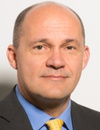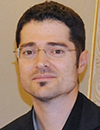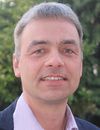Daria Camilla BoffitoCanada Research Chair in Engineering Process Intensification and Catalysis (EPIC) and Associate Professor, Polytechnique Montréal Daria C. Boffito is Associate professor in Chemical Engineering at Polytechnique Montréal. She is Canada Research Chair (2021-2026) in Engineering Process Intensification and Catalysis (EPIC) and head of the EPIC research team. She was previously Canada Research Chair in Intensified Mechano-Chemical Processes for Sustainable Biomass Conversion (2016-2021). In 2019 she was featured as an Emerging Leader in Chemical Engineering (Canadian Society for Chemical Engineering). |
Volker HesselProfessor,, The University of Adelaide Prof. Volker Hessel studied chemistry at Mainz University/D. 1994: Institut für Mikrotechnik Mainz/Germany (Director R&D); 2005: Professor Eindhoven University of Technology/NL; 2018: Deputy Dean (Research), Professor University of Adelaide, Australia; 2019: part-time professor University of Warwick/UK. |
C. Oliver KappeProfessor and Scientific Director, Center for Continuous Flow Synthesis and Processing, University of Graz C. Oliver Kappe is Professor of Chemistry at the University of Graz (Austria) and Scientific Director of the Center for Continuous Flow Synthesis and Processing (CC FLOW) at the Research Center Pharmaceutical Engineering GmbH (RCPE). He received his diploma (1989) and his doctoral (1992) degrees in organic chemistry from the University of Graz where he worked with Gert Kollenz on cycloaddition and rearrangement reactions of acylketenes. After periods of postdoctoral research work on reactive intermediates and matrix isolation spectroscopy with Curt Wentrup at the University of Queensland in Brisbane, Australia (1993-1994) and on synthetic methodology/alkaloid synthesis with Albert Padwa at Emory University in Atlanta, USA (1994-1996), he moved back to the University of Graz in 1996 to start his independent academic career. He obtained his „Habilitation“ in 1998 in organic chemistry and was appointed Associate Professor in 2000. Since 2011 he is Professor for „Technology of Organic Synthesis“ (Organische Synthesetechnologie) at the Institute of Chemistry at the University of Graz. He has spent time as visiting scientist/professor at e.g. the Scripps Research Institute (La Jolla, USA, K. Barry Sharpless, 2003), the Toyko Institute of Technology (Toyko, Japan, T. Takahashi, 2008), the Sanford-Burnham Institute for Medical Research (Orlando, USA, 2010) and the Federal University of Rio de Janeiro (Rio de Janeiro, Brazil, 2013-2015). |
Guangsheng LuoProfessor, Tsinghua University Prof. Guangsheng Luo is a Cheung Kong distinguished professor and Head of State Key Laboratory of Chemical Engineering. He received his Ph.D. and B.Sc. degrees in 1993 and 1988, respectively, both from Tsinghua University. His research interests include microstructured chemical systems, separation science and technology, and functional materials. He has published more than 300 papers in peer-reviewed journals and holds more than 100 Chinese patents. He was awarded the National Science Fund for Distinguished Young Scholars, and he is the recipient of several awards, including the second prize of China State Technological Invention Award. His is also a Fellow of the Royal Society of Chemistry. |
Victor SebastianFull Professor, University of Zaragoza Dr. Victor Sebastian Cabeza, is Full Professor within the Chemical Engineering Department and the Nanoscience and Materials Institute of Aragon at the University of Zaragoza (Spain). Victor Sebastian obtained his PhD in Chemical Engineering from the University of Zaragoza (2008). Dr. Sebastian has enjoyed numerous research stays as invited and Post-Doc researcher at several excellent research centers: University of Aveiro (Portugal), The European Membrane Institute (France), the Mainz Institute of Microtechnology (Germany), SINTEF (Norway), and the Massachusetts Institute of Technology (MIT-USA). |
Thomas WirthProfessor, Cardiff University Thomas Wirth is professor of organic chemistry at Cardiff University. After studying chemistry in Bonn, he obtained his PhD and at the Technical University of Berlin. After a postdoctoral stay at Kyoto University, he started his independent research at the University of Basel in 1994, before taking up his current position at Cardiff University in 2000. He was invited as a visiting professor to several places. Thomas Wirth was awarded the Werner-Prize from the New Swiss Chemical Society (2000), the Furusato award from JSPS London (2013) and the Wolfson Research Merit Award from the Royal Society and the Bader Award from the Royal Society of Chemistry (2016). In 2016 he was elected as a fellow of The Learned Society of Wales. His main interests of research concern stereoselective electrophilic reactions, oxidative transformations with hypervalent iodine reagents including mechanistic investigations and organic synthesis performed in microreactors. |




